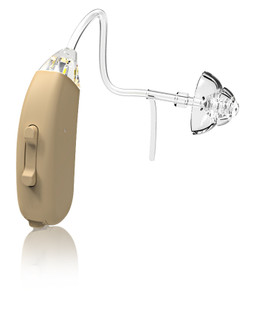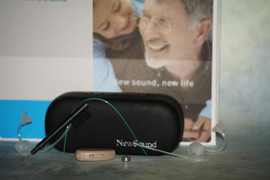Discovering the Right Solution for Hearing Loss Hearing Aids vs Cochlear Implants
Posted by DR Paul on Jul 01, 2024
Living with hearing loss can be challenging, but today's advanced technology offers solutions that can significantly improve your quality of life. If you're considering either a hearing aid or cochlear implant, it's essential to make an informed decision. This blog will provide a comparative analysis of both devices, their pros and cons, and help you determine which option might be best for you.
Understanding Hearing Loss
Hearing loss affects millions of people worldwide. It can stem from various causes, such as aging, exposure to loud noises, or genetic factors. Understanding the type and degree of hearing loss is crucial in selecting the appropriate device. A thorough hearing test by an audiologist can provide insights into your specific condition and guide you towards the most suitable solution.
The Basics of Hearing Aids
Hearing aids are small electronic devices worn in or behind the ear. They amplify sounds, making it easier for individuals with hearing loss to communicate and participate in daily activities. These devices are available in various styles, including behind-the-ear (BTE), in-the-ear (ITE), and completely-in-canal (CIC) models. Each style has its own set of features and benefits.
Types of Hearing Aids
1.Behind-the-Ear (BTE) - BTE hearing aids are popular due to their versatility and power. They are suitable for individuals with mild to severe hearing loss. These devices rest behind the ear and connect to an earmold inside the ear canal.
2.In-the-Ear (ITE) - ITE hearing aids are custom-made to fit the outer part of the ear. They are less visible than BTE models and are suitable for mild to moderate hearing loss.
3.Completely-in-Canal (CIC) - CIC hearing aids are the smallest and least visible. They fit entirely inside the ear canal and are ideal for mild to moderate hearing loss.
Advantages of Hearing Aids
Hearing aids come with numerous benefits that make them a popular choice for many individuals with hearing loss.
Ease of Use
One of the primary advantages of hearing aids is their ease of use. Once properly fitted by an audiologist, they are simple to operate and maintain. Users can quickly adjust settings to suit different environments, ensuring optimal hearing in various situations.
Cost-Effective
Hearing aids are generally more affordable than cochlear implants. They are available in a wide range of prices, making them accessible to a broader audience. Many insurance plans also cover the cost of hearing aids, further reducing the financial burden.
Non-Invasive
Hearing aids are non-invasive devices. Unlike cochlear implants, they do not require surgery, making them a safer option for individuals who may have medical conditions that preclude them from undergoing surgical procedures.
Disadvantages of Hearing Aids
While hearing aids offer numerous benefits, they are not without their drawbacks. It's essential to consider these factors when deciding if hearing aids are the right choice for you.
Limited Effectiveness
Hearing aids amplify sounds, but they may not be effective for individuals with severe or profound hearing loss. In such cases, the amplified sound may still be insufficient for effective communication.
Background Noise
Hearing aids can sometimes amplify background noise along with speech, making it challenging to focus on conversations in noisy environments. Advanced models include noise-reduction features, but they may not completely eliminate this issue.
Maintenance
Hearing aids require regular maintenance, including cleaning and battery replacement. While these tasks are relatively simple, they can be inconvenient for some users.
The Basics of Cochlear Implants
Cochlear implants are electronic devices that provide a sense of sound to individuals with severe to profound hearing loss. Unlike hearing aids, which amplify sound, cochlear implants bypass damaged parts of the ear and directly stimulate the auditory nerve. This allows individuals to perceive sound even if their hearing loss is significant.
Components of Cochlear Implants
1.External Processor - The external processor captures sound and converts it into digital signals. It is worn behind the ear, similar to a hearing aid.
2.Internal Implant - The internal implant receives the digital signals and converts them into electrical impulses. It is surgically implanted under the skin and connected to electrodes placed in the cochlea.
Advantages of Cochlear Implants
Cochlear implants offer several benefits, particularly for individuals with severe to profound hearing loss.
Improved Hearing
Cochlear implants can significantly improve hearing for individuals who do not benefit from hearing aids. They provide clearer sound and better speech understanding, even in challenging listening environments.
Better Speech Development
For children with severe hearing loss, cochlear implants can facilitate better speech and language development. Early implantation allows children to develop communication skills at a critical stage of their growth.
Enhanced Quality of Life
Many cochlear implant users report an improved quality of life. They can participate in conversations, enjoy music, and engage in various social activities, leading to greater independence and satisfaction.
Disadvantages of Cochlear Implants
Despite their benefits, cochlear implants have certain drawbacks that potential users should consider.
Surgical Risks
Cochlear implants require surgery, which carries inherent risks, such as infection, bleeding, and complications from anesthesia. It's essential to discuss these risks with a medical professional before deciding.
High Cost
Cochlear implants are more expensive than hearing aids. The cost includes the surgery, the device, and post-implantation therapy. While some insurance plans cover these costs, not all do, making it a significant financial investment.
Adjustment Period
Adjusting to a cochlear implant can take time. Users may need several months of therapy to learn how to interpret the new sounds they hear. This adjustment period requires patience and commitment.
Comparing Hearing Aids and Cochlear Implants
When deciding between hearing aids and cochlear implants, it's essential to consider several factors, including the severity of your hearing loss, lifestyle needs, and financial situation.
Severity of Hearing Loss
Hearing aids are suitable for individuals with mild to moderate hearing loss, while cochlear implants are designed for those with severe to profound hearing loss. An audiologist can help determine which option is best for you based on your specific hearing profile.
Lifestyle Needs
Consider your daily activities and lifestyle when choosing between hearing aids and cochlear implants. If you lead an active lifestyle and need a device that's easy to manage, hearing aids may be more suitable. However, if your hearing loss significantly impacts your ability to communicate, a cochlear implant may offer greater benefits.
Financial Considerations
Both hearing aids and cochlear implants require an investment, but cochlear implants are generally more expensive. Consider your budget and explore insurance options to determine which solution is financially feasible for you.
Seeking Professional Advice
Before making a decision, it's crucial to consult with hearing professionals, such as audiologists and otolaryngologists. They can provide personalized recommendations based on your hearing needs and medical history. Additionally, they can offer insights into the latest advancements in hearing technology.
Real-Life Experiences
Hearing from individuals who have used hearing aids or cochlear implants can provide valuable perspectives. Many online communities and support groups exist where users share their experiences and offer advice to those considering these devices. Listening to their stories can help you make a more informed decision.
Keeping Up with Technology
The field of hearing technology is continually evolving. Staying informed about the latest advancements can help you make the best choice for your hearing needs. Subscribe to newsletters, follow hearing technology blogs, and attend seminars or webinars to stay updated on new developments.
Benefits of Joining a Hearing Community
Joining a community of individuals with hearing loss can provide support and encouragement. These communities often offer resources, such as educational materials, support groups, and social events. Being part of a community can help you feel less isolated and more empowered in managing your hearing loss.
Making the Decision
Deciding between hearing aids and cochlear implants is a personal choice that depends on various factors. Take the time to research, consult with professionals, and weigh the pros and cons of each option. Remember, the goal is to improve your quality of life and enhance your ability to communicate effectively.
Final Thoughts
Both hearing aids and cochlear implants offer valuable benefits for individuals with hearing loss. By understanding the differences, advantages, and disadvantages of each device, you can make an informed decision that best suits your needs. Whether you choose a hearing aid or cochlear implant, the most important thing is to take action towards better hearing.
If you're ready to explore further, visit hear-better.com for more information and resources.










